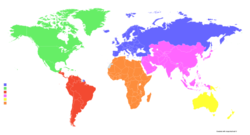Men's tournament
From 2001 to 2009 Beach Handball was contested as a demonstration event. Since the 2013 edition the sport has been formally recognized as part of the World Games program. [2]
| Year | Host | Gold-medal match | Bronze-medal match | ||||||
|---|---|---|---|---|---|---|---|---|---|
| Score | Score | Fourth place | |||||||
| 2001 Details | Akita | Belarus | 2 – 1 | Spain | Brazil | 2 – 1 | Iran | ||
| 2005 Details | Duisburg | Russia | 2 – 0 | Spain | Croatia | 2 – 1 | Germany | ||
| 2009 Details | Kaohsiung | Brazil | 2 – 0 | Hungary | Croatia | 2 – 0 | Oman | ||
| 2013 Details | Cali | Brazil | 2 – 0 | Russia | Croatia | 2 – 1 | Qatar | ||
| 2017 Details | Wrocław | Brazil | 2 – 1 | Croatia | Qatar | 2 – 1 | Hungary | ||
| 2022 Details | Birmingham | Croatia | 2 – 1 | Qatar | Brazil | 2 – 0 | United States | ||
| 2025 Details | Chengdu | Germany | 2 – 1 | Portugal | Brazil | 2 – 0 | Spain | ||
